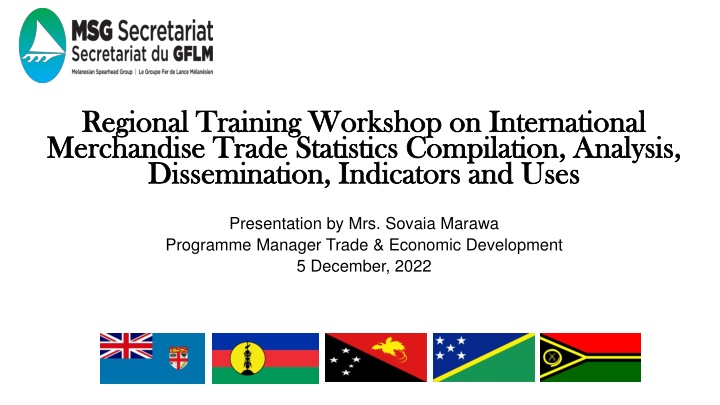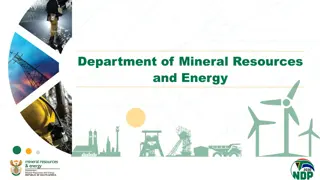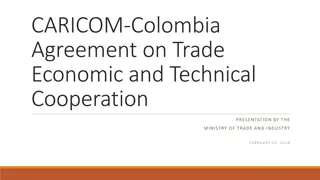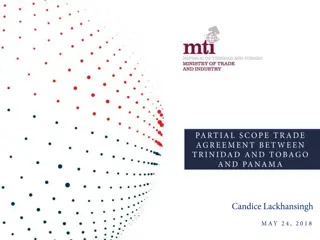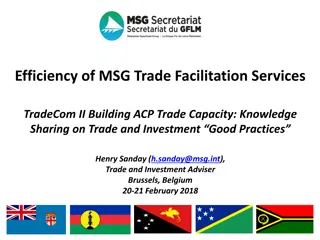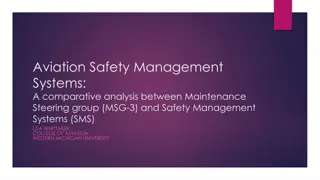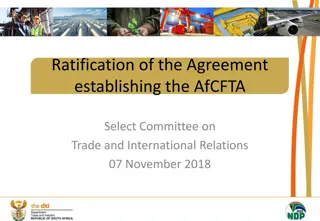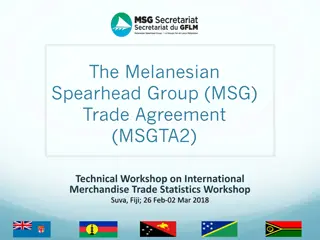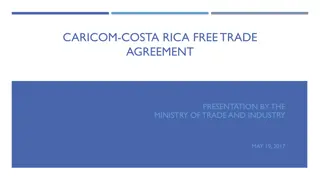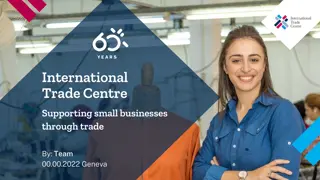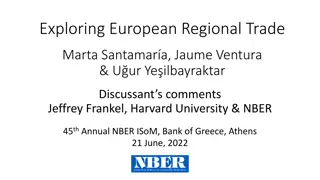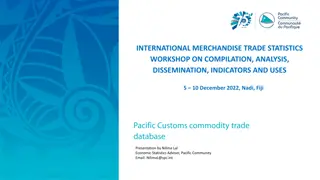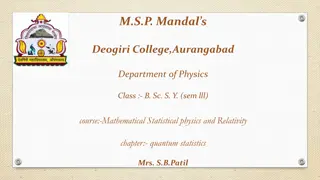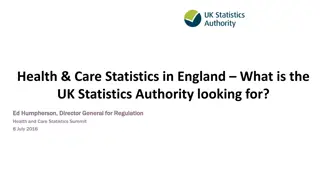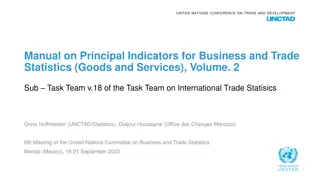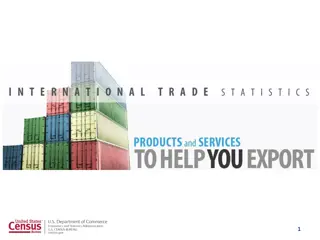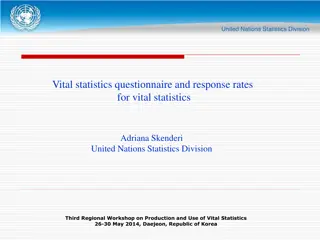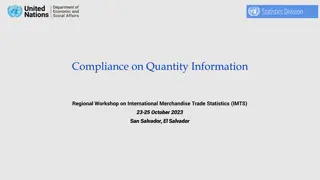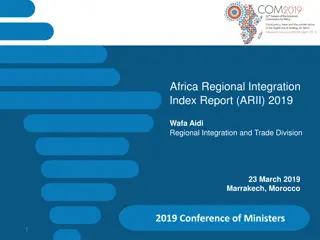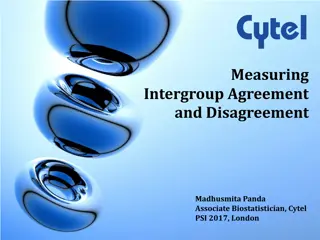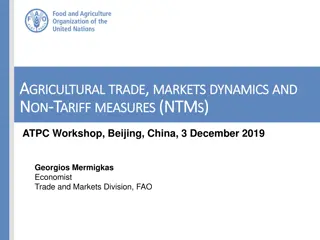Overview of Regional Training Workshop on International Merchandise Trade Statistics and MSG Trade Agreement
The Regional Training Workshop focuses on International Merchandise Trade Statistics Compilation, Analysis, and Dissemination, shedding light on the Vision of MSG 2038 Prosperity for All Plan, MSG Trade Agreement, and key recommendations. The workshop delves into the background of MSGTA, its evolution, and the specific products covered under MSGTA2, emphasizing the gradual liberalization of tariffs for intra-regional trade and promotion of fairness and competition in trade.
Download Presentation

Please find below an Image/Link to download the presentation.
The content on the website is provided AS IS for your information and personal use only. It may not be sold, licensed, or shared on other websites without obtaining consent from the author.If you encounter any issues during the download, it is possible that the publisher has removed the file from their server.
You are allowed to download the files provided on this website for personal or commercial use, subject to the condition that they are used lawfully. All files are the property of their respective owners.
The content on the website is provided AS IS for your information and personal use only. It may not be sold, licensed, or shared on other websites without obtaining consent from the author.
E N D
Presentation Transcript
Regional Training Workshop on International Regional Training Workshop on International Merchandise Trade Statistics Compilation, Analysis, Merchandise Trade Statistics Compilation, Analysis, Dissemination, Indicators and Uses Dissemination, Indicators and Uses Presentation by Mrs. Sovaia Marawa Programme Manager Trade & Economic Development 5 December, 2022
Outline Outline 1. Vision of MSG2038 Prosperity for All Plan 2. MSG Trade Agreement (MSGTA) 3. Melanesian Free Trade Agreement (MFTA) 4. Recommendations
Vision of MSG 2038 Prosperity for All Plan Vision of MSG 2038 Prosperity for All Plan Vision: MSG community that is democratic, strong, integrated, enlightened, happy, prosperous, secure and caring .
Background Background 1993: Original MSGTA entered into force (PNG, Solomon Islands and Vanuatu. Fiji joined in 1996) 2005: MSGTA2 was adopted and still in force MSGTA1 positive list; MSGTA2 negative list Members (except Solomon Islands) agreed to an 8-year tariff liberalization schedule Fiji & Vanuatu without a negative list but PNG exceptions mackerel, salt & sugar & Solomon Islands
MSG Trade Agreement MSG Trade Agreement To enhance intra-regional trade and contribute to the deepening of MSG integration through the gradual liberalization of tariffs on goods imported from other MSG countries To contribute to the harmonious development and expansion of world trade through the gradual reduction and/or elimination of other protectionist mechanisms To promote fairness and competition in trade
MSGTA2 Products MSGTA2 Products Imported MSG originating products are not subject to customs duties as per MSGTA Article 9.5 of MSGTA - Products Chapter 22, 24 & 27 excluded from tariff reduction in MSGTA i) Chapter 22 Beverage, wine and Vinegar ii) Chapter 24 Tobacco and manufactured tobacco substitutes iii) Chapter 27 Mineral fuels, mineral oils and products of distillation iv) Cane sugar HS 1701 1100 Article 15 Exceptions of MSGTA recognize Members have the right to regulate domestic industries necessary to protect human, animal or plant life or health
Background on MFTA Background on MFTA 1. Broadening and deepening MSG economic integration through making commitments on, among other areas: i) Trade in Goods ii) Trade in Services iii) Labour mobility iv) Cross-border investment v) Electronic Commerce 2. Ensuring intra-MSG trade takes place under conditions of fair and competitive treatment 3. MFTA awaiting ratification- Fiji & Solomon Islands have signed.
MFTA MFTA - - Trade in Goods ( Trade in Goods (Chpt Chpt 2) 2) 1. MSG/Pacific originating products (eg. fresh, frozen and chilled fish to canned fish), virgin coconut oil, kava to kava tablets/ice cream) 2. Customs duty free except for certain items (eg. cane sugar, fowl, salt (<25kg) etc). 3. MSG Rules of Origin 4. Sanitary & Phyto sanitary standards
MFTA MFTA - - Trade in Services ( Trade in Services (Chpt Chpt 6) 6) Facilitates foreign (MSG) supply of services across the MSG countries 4 Modes of Services Supply: Mode 1 - Cross-border trade (Professional, Computer Related Services, Telecommunications, Courier, Consultancy Services) Mode 2 - Consumption abroad (tourism) Mode 3 - Commercial presence (MSG companies setup businesses in region) Mode 4 - Temporary movement of natural persons (MSG Labour Mobility people, skills and remittances)
MFTA MFTA - - Labour Labour Mobility ( Mobility (Chpt Chpt 7) 7) Facilitates the movement and engagement of skilled MSG workers for temporary employment in MSG Countries Mutual recognition of skills gained and qualifications eg. USP recognized across the region Origin of labour mobility workers taking up seasonal work under different labour schemes (eg. MSG skilled people, Pacific Labour Scheme) Standard Contract of Employment Each country designates, in a schedule in the MFTA, the applicable professions and qualifications (eg. Vanuatu health, midwives) Provide for procedures and administrative mechanisms to facilitate the temporary movement and employment of nationals Free transfer of funds without delay Remittances from each market under different labour schemes
MFTA MFTA - - Electronic Commerce (Part 7 TIS) Electronic Commerce (Part 7 TIS) Digital age is driving innovations and transforming small businesses Capitalise on opportunities from electronic commerce (noting legal and regulatory work at national level) i) types of products traded (Internet sales by product and companies) ii) volume and value of trade (mobile, bank payments) MSG E-Commerce cooperation
MFTA MFTA - - Cross Border Investments ( Cross Border Investments (Chpt Chpt 8) 8) Provides a framework for the fair and equal treatment of foreign (MSG) investors and investments in other MSG countries Each country has listed in a schedule, those investments/business sectors they designate as reserved for their nationals/locals or as exceptions to the fair and equal treatment requirements Trade & investment facilitation
Research & Statistics ( Research & Statistics (Chpt Chpt 10.7) 10.7) 1. Parties shall cooperate in the areas of research and statistics necessary for monitoring the performance and operation of the Melanesian Free Trade Area. 2. Cooperation for purposes of this Article shall include the following areas: (a) Policy research and trade development; (b) Joint capacity building including joint training; (c) Harmonisation of statistical systems and data management; and (d) Exchange of information. 3. Parties shall facilitate the establishment of national and trade information regional databases and networks for the MFTA.
Recommendations Recommendations 1. Understand and assess level of commerce and industry development for exports and imports including diversification of industries and small businesses (eg. Coconut oil) 2. Evidence based decision making to assess depth, impact and progress of trade liberalization within MSG countries Trade in goods, trade in services, investments, labour mobility 3. Country obligations and commitments on transparency (MSG sub- regional, regional and international level)
Recommendations Recommendations 4. Regional Collaborations & Partnerships (eg. MSG/OCO/PIFS/SPC/PACER Plus i) Collaborations eg. Pacific Commodity Trade Database System, PIFS E-Commerce Strategy, SPC Trade Statistics Workshops, SPC/OCO PACCHS2017) ii) Sub-regional cooperation (eg. Customs/Trade/statistics) 5. Sub-regional cooperation (MSG Customs/NSOs)
Tankiu Tumas! For any queries please contact the MSG Secretariat on: s.marawa@msg.int Tel: +678 27791.
